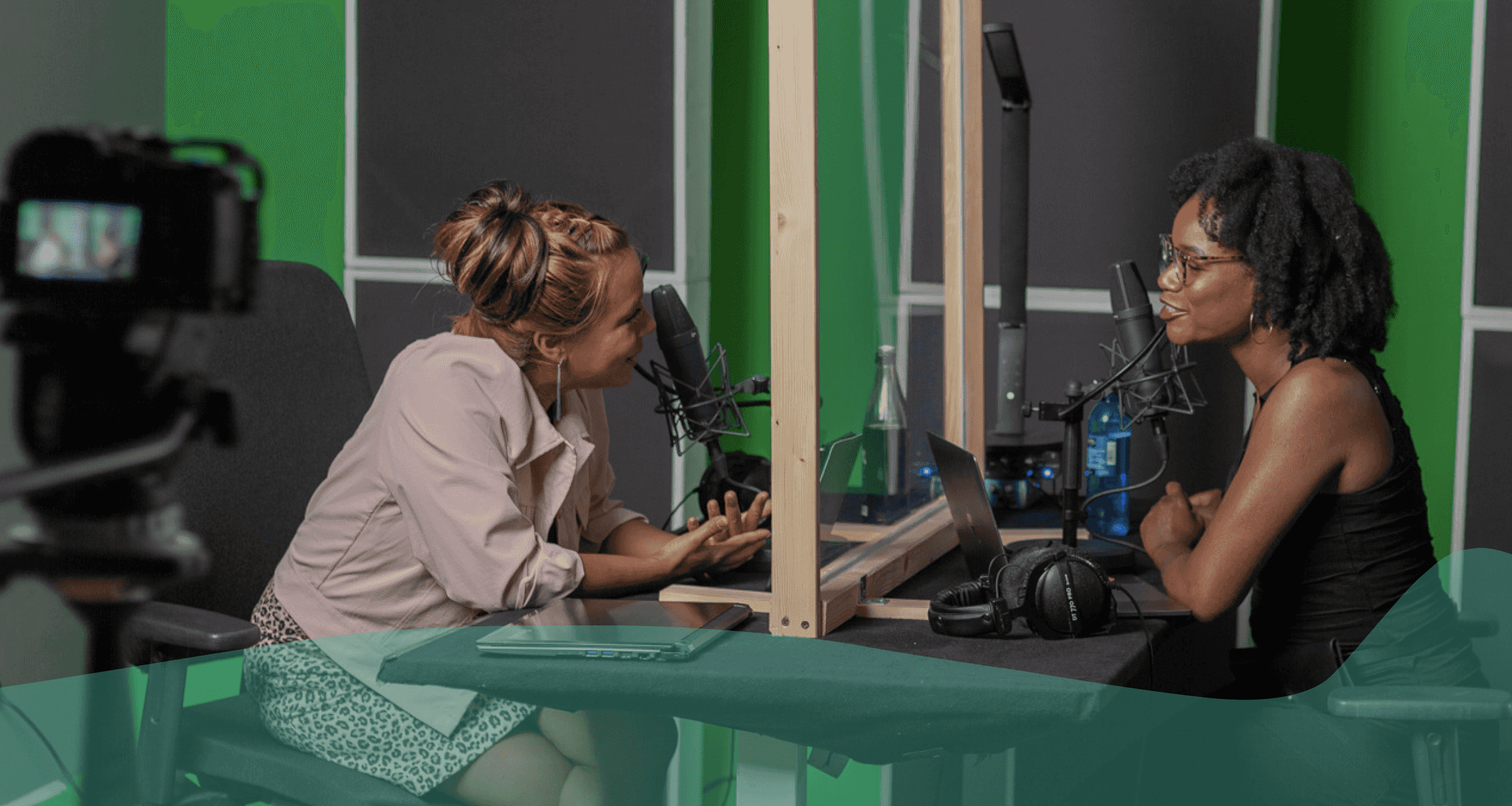
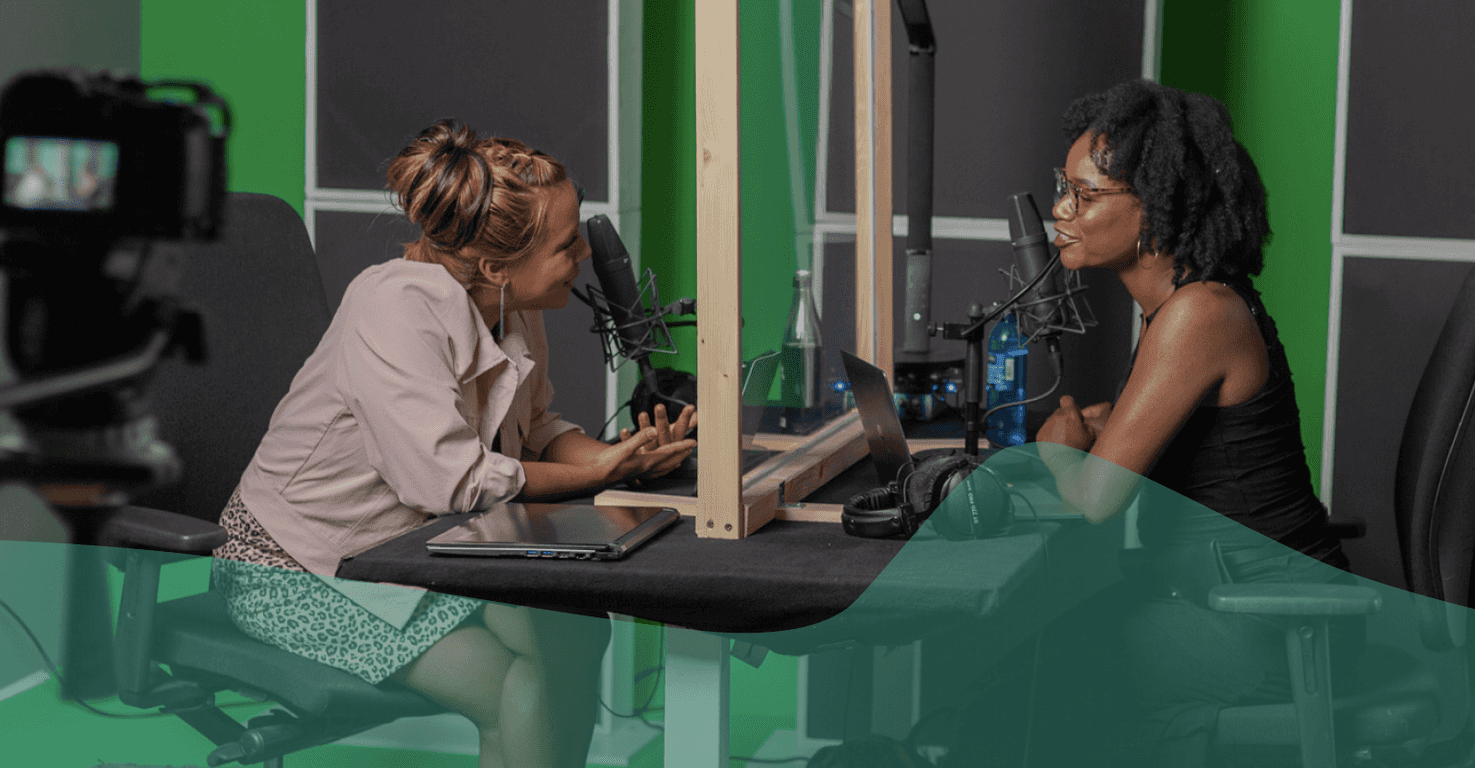
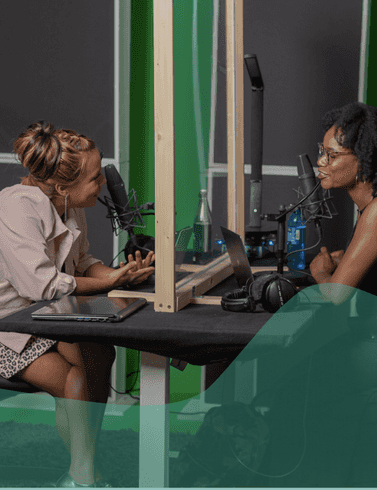
A podcast about how hormones shape our world.
Latest episode:
Who you gonna call? Mythbusters!
About Hormonal
Hormones affect everyone and everything: from skin to stress to sports.
But for most of us, they're still a mystery.
Even the way we talk about hormones makes no sense. ("She's hormonal.")
So let's clear some things up. Each week, Rhea Ramjohn is asking scientists, doctors, and experts to break it all down for us.
Subscribe on your favorite platform:
Episodes
- Season 1
- Season 2

Episode 0
August 25, 2020
A Sneak Peek at Season 2
As we work hard on Season 2 of the Hormonal podcast, we’re dropping into your feed with a special request, and a small behind the...
5 min
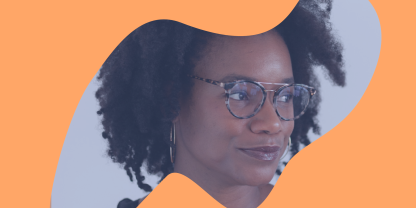
Episode 1
October 11, 2020
Hot or not? Birth control & sex drive
How birth control affects your sexual desire, self image, and weight fluctuations.
25 min
Support Hormonal & the period tracker that’s different from the rest.
Subscribe to Clue Plus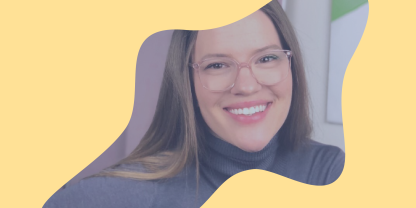
Episode 2
October 19, 2020
The ABC: Abortion & Birth Control
What’s it like to get an abortion and the surprising ways the pandemic is changing abortion access.
34 min
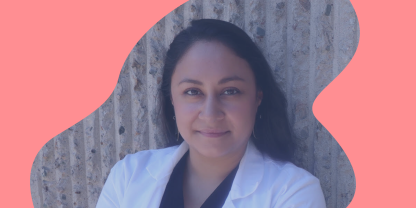
Episode 3
October 26, 2020
The many sides of side effects
Hormonal birth control: positive, negative, and neutral effects
33 min
Support Hormonal & the period tracker that’s different from the rest.
Subscribe to Clue Plus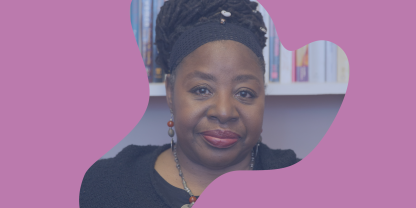
Reproductive choice and reproductive justice
with Dr. Loretta Ross
Episode 4
November 2, 2020
Reproductive choice and reproductive justice
Accessing birth control against the odds
35 min

Episode 5
November 9, 2020
Happy birthday, birth control
Controversy and celebration on the 60th anniversary of the pill
42 min

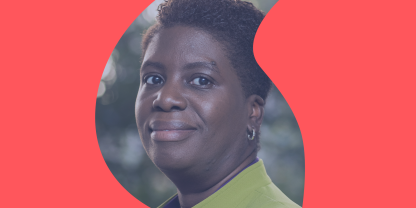
Episode 7
November 23, 2020
Risky business: birth control during COVID-19
COVID-19 is changing how we access birth control
30 min
Support Hormonal & the period tracker that’s different from the rest.
Subscribe to Clue Plus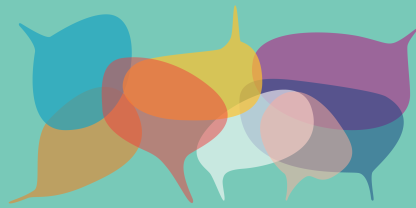
Who you gonna call? Mythbusters!
with Lynae Brayboy, Amanda Shea & Hajnalka Hejja
Episode 8
November 30, 2020
Who you gonna call? Mythbusters!
Clue’s Science Team busts your birth control myths
37 min
Credits
Season 2
Executive Producer: Kassandra Sundt
Host: Rhea Ramjohn
Editorial Help from: Amanda Shea, Steph Liao, Nicole Leeds
Clue Design: Marta Pucci & B.J. Scheckenbach
Web Team: Yomi Eluwande, Jane Parr-Burman, Maddie Sheesley
Special Thanks: Trudie Carter, Ryan Duncan, Aubrey Bryan,
Claudia Taylor, Léna Calvarin, Lynae Brayboy
Mixing and recording help from: Bose Park Productions & Rekorder Studios in Berlin.
About Clue
Clue is a period tracking app that uses data and science to help women and people wih cycles to understand their bodies. It's also a menstrual and reproductive health encyclopedia.
Learn more about the Clue app and check out what Clue is doing to advance menstrual health research.
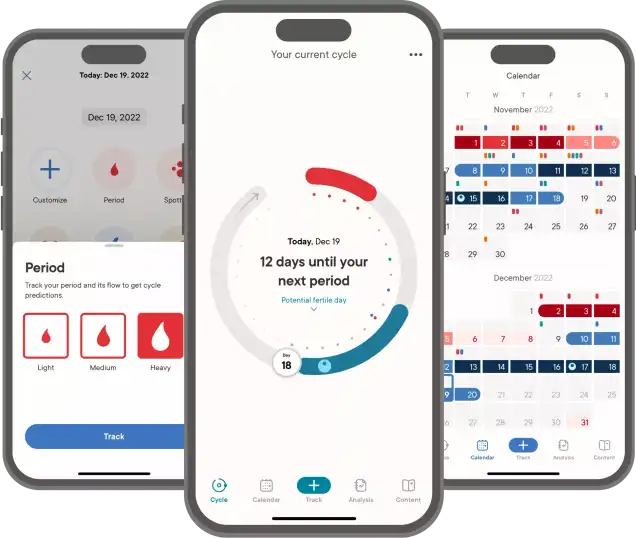
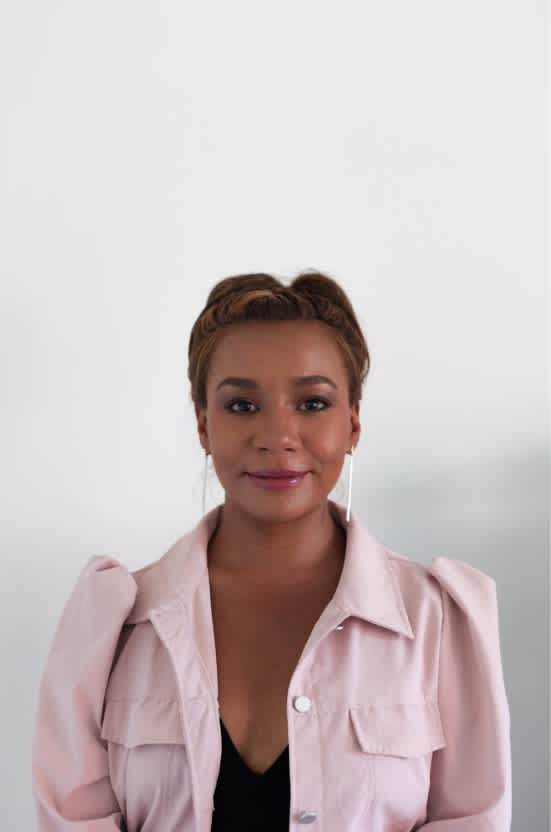
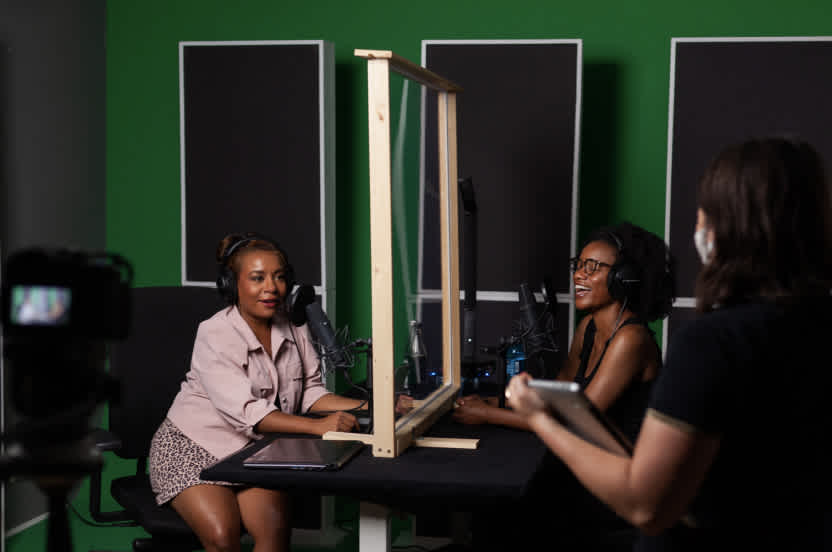
Rhea Ramjohn,
host of the Hormonal Podcast


Rhea Ramjohn,
host of the Hormonal Podcast
Your Host
The more knowledge we have about our hormones, our medical & menstrual care, and our reproductive rights, the more we empower ourselves and one another.
Hormonal has offered me the true privilege of speaking with people who have the expertise on the scientific knowledge about our hormones and cycles, as well as those sharing their lived experiences, caring for people with menstruation and how, all combined, shapes our lives everyday.
Gathering facts as well as personal stories are so vital to our understanding of our health, our his/herstories, and our cultures. I deem it a privilege because we haven't had many platforms nor opportunities for menstrual health information being broadly accessible.
Episode 5
Acne isn’t just for teens
Acne isn’t just for teens
When it comes to skin appearance, there are a few factors under our control—and some others are all hormonal.
About
Many of the effects that hormones have on the body are internal. But there’s definitely one way that fluctuating hormones are visible to us: acne.
If you’re someone who’s had a few periods already, you probably know when you’re most likely to break out. Or, alternatively, when your hormones are most likely to help your skin look it’s healthiest. But when it comes to skin appearance, there are quite a few factors to keep in mind about what’s under our control—and what’s under the influence of our hormones.
Today we’re joined by Dr. Tiffany Clay from Dermatology Affiliates in Atlanta, Georgia. You can follow her on Instagram @dermdrclay.
Transcript
This transcript and interview were edited for clarity.
Rhea Ramjohn: Hi, it’s Rhea Ramjohn and you’re listening to Hormonal, brought to you by Clue. Clue is the period tracking app and menstrual encyclopedia -- where you can get the answers to all of your questions, like, does my hair change during pregnancy?
When I think of hormones the first things that come to mind are often internal. Estrogen and ovaries. Insulin and the pancreas. Serotonin and the brain. But what about the biggest organ in, or should I say on, the human body. Your skin! It might be one of the only ways that hormones and their effects are visible to us. And it's clear that lots of us want to at least look our best.
The facts are in the figures. Just last year in 2018, the skin care industry was worth $123.1 billion!
But serums and face masks might not be the cure at all, because hormones, and a bunch of other factors, actually have a big impact on your skin’s health and appearance.
We're joined now for more by Dr. Tiffany Clay. She practices in Atlanta Georgia in the United States at Dermatology Affiliates.
Dr. Clay thanks so much for joining us.
Tiffany Clay: Thanks for having me.
Rhea: I want to start with clearing up, what I feel are like lies from a pamphlet from health class, probably sometime in middle school, which made it seem like pimples were only a teenage problem caused by these so-called raging hormones. Personally that has not been my experience. So let me start with what might be an obvious question: How does a pimple form and where does acne come from?
Tiffany: There are several factors. So a pimple is formed on the surface of the skin and typically your average pimple will form in the oil gland, which would be [from] having over production of oil. Or it could be clogged from the surface. And then we get inflammation, inflammatory cells, that come into that area and that's what causes the redness, the pain, the swelling on that area.
So different circumstances can cause acne. Your teenage acne is typically driven by more of occlusion or something that's clogging the surface of the skin. So, we tend to see lots of blackheads, white heads, which are just these clogged pores. However in adulthood, which many people don't think about, many adult women are getting hormonal acne, so this is from their internal hormones causing inflammation under the skin, not necessarily something that's clogging the surface of it.
Rhea: That's exactly what I wanted to get into today. But before we get to that could you tell us what exactly is the difference between black heads, pimples and acne?
Tiffany: Yes. So acne is the overall umbrella term for any painful bump that comes up on the skin, typically. So a black head or a white head, we call them comedones, and these are clogged pores. So a white head is one of the tiny little bumps that are on the skin that are formed from clogged pores, but the surface of it is covered. And a black head is the same exact type of clogged pore, however, it's open. So you kind of tend to see some of the dirt and oil inside that looks dark.
The next category of a type of acne bump is what you typically would call a pimple or zit. These are those really red kind of painful bumps that come up sometimes they're not... I shouldn't say this, but, they're not "pop-able." [laughs] So they're kind of covered on the surface but you can you can see the redness and feel them. There are also a type of pimple that are called pustules, so they are red at the base in slightly raised but then the center of them will have, like a little yellowish hue which is pus.
And then lastly there are cysts, and cysts are typically not seen very well but they are very much felt. So they can be felt underneath the skin and they are often extremely painful. And all of those encompass acne.
Rhea: Thank you so much for clearing that up. I mean, don't be afraid to get in to all of the gory details because this is definitely a topic I think that interests really everyone, because we do at least to some extent care about our appearances. And as you well know sometimes these conditions can be really painful and uncomfortable for someone, so let's get into this a little bit deeper at least the science part of it, are hormones directly responsible for any of those?
Tiffany: Yes. So hormones are directly responsible for the pimples or zits, which we call inflammatory papules, typically, and also for cystic acne. So, the larger cysts that are underneath the skin that you can't quite pop, but they hurt a lot.
Rhea: How do hormones create the cystic acne and pimples?
Tiffany: So hormones such as androgens, which are male type hormones, and this is specifically in women, they are increasing the activity of the oil glands and increasing inflammation in the skin and it's typically in the lower third of the face. So your jaw line, your lower cheeks, your chin, sometimes on the top of the upper parts of the neck, we'll start to have inflammation in those oil glands like I discussed before and that causes, kind of, these like underground pimples.
Rhea: Mhmm. I see. OK. And what about the adult acne that you mentioned earlier you said that there are more women who are coming forward with adult acne, and we know that they may or most likely did not have acne as teenagers. Could you tell us a little bit more about that. What are some of the causes for that and what role hormones are playing?
Tiffany: Sometimes there's just a natural progression or a natural shift, where as we age our estrogen levels will decrease a bit. And so that gives our androgens, or our male type hormones, a little bit more leeway. So it's kind of like the tipping of a seesaw, where the male hormones kind of take over and so that can happen just naturally.
Some other cases where it can happen is if a patient has polycystic ovarian syndrome, which is a condition where some women will have higher androgen levels naturally. And in other cases that can happen artificially from intrauterine devices, or IUD, which are taken for birth control, which may exert some more androgen effect than is natural for that person.
Rhea: OK. So does this mean that if a person is having cystic acne, adult acne, so not just the run of the mill blackheads and whiteheads, but if they're having this kind of severe acne that's created by hormones, is it because it's a sign of hormonal imbalance?
Tiffany: Not always. So, some people are just going to have your average type of acne, that may be more genetic, if their parents and their siblings were more prone to acne they might be as well. But yes, a small fraction of those people will just hormonally have that hormonal driven type of acne.
Rhea: OK. So I'm going to get personal for just a moment. I was one of those people as a teenager, I did not have acne. And then I developed it as an adult. And for a very long time I struggled believing that it had something to do with hormones. I mean I tended to have breakouts in the week leading up to my period and eventually, I was prescribed antibiotics and then the acne went away and I never really found out what was the root of the problem. But I can't help but still wonder, it's still nagging me in the back of my mind, like how exactly are the hormones creating cystic acne on a person's body? What does the research say in general, I mean is there a lot of research that's going on in your field about how hormones play a role in cystic acne? And adult acne?
Tiffany: Not so much about how it plays a role, but in ways that we can prevent it or treat it once it's there. But there isn't much in our dermatology literature as far as why these hormones are changing and why they're affecting the skin this way.
Rhea: But that would be really interesting to find out because I'm just wondering, you know, if someone could, if it is hormonally based, you know can we just sort of like get a shot of progesterone or estrogen and then all of the acne goes away?
Tiffany: That would be nice. That would save so many people the trouble of having it. [laughter]
Rhea: For sure. For sure. OK. Well I also have a few other questions. What about melanin levels? I'm a Black and Asian woman. I have heavily melanated skin, when you're doing treatments for acne and you're looking at how you can prevent acne, do you have to take melanin levels into consideration or is all skin the same?
Tiffany: All skin is different, in regards to melanin levels, and I don't think that the approach is different. I want to treat all patients to get them clear. And typically the approach is the same. However with darker skinned patients, I do have to focus more on the after effects of the acne, so patients with darker skin types are going to be more prone to hyperpigmentation or dark spots after the acne has gone behind. So it's kind of it just adds a little bit more to the treatment plan for them.
Rhea: And what is that treatment plan actually? What should I look out for?
Tiffany: So typically we always want to make sure that sunscreen is a part of everyone's daily routine. We want to keep the sun away from the skin so that those dark spots aren't getting worse each day. And then adding in other products topically that are going to be adjuncts, to maybe a systemic therapy, that will help to fade discoloration and maybe even prevent it.
Rhea: OK so that means we have to break that myth that people with melanin don't need sunscreen, right?
Tiffany: That's right. [laughter]
Rhea: Absolutely. I put it on every day.
Tiffany: That is awesome.
[SPONSOR BREAK]
Announcer: Hormonal is brought to you by Clue. The period tracking app, and menstrual health encyclopedia, that takes YOUR cycle seriously.
Did you know that there’s more to Clue than just telling you about your next period?
Amanda is the head of content at Clue, but she's also a long time Clue user. And she’s learned a lot.
Amanda: The first thing was I didn't know that you couldn't get pregnant at just any old time. I didn't know that there were certain periods of your cycle where you're more fertile than others. That was game changing. But then I also didn't know that like my skin was also part of my cycle, my mood. Obviously, I knew about PMS but I didn't know that there could be parts of my cycle where I felt really great and that was linked to my cycle.
So I just learned so much about myself through using Clue. It really changed my relationship to my body in a positive way. I felt really empowered by it.
Announcer: To support the science-backed app that strives to help you build a better relationship with your body, subscribe to Clue Plus.
Your subscription funds the work here at Clue, the period tracking app that doesn't sell your data, doesn't show you a bunch of ads, and was founded and is led by women.
For more information -- check out Clue.Plus.
Alright, back to the show.
[End of Sponsor Break]
Rhea: Ok. So. Confession. I’ve noticed some changes in my skin’s appearance as I’ve gotten older. So, I’m curious, on average, what about as we age? How do hormones fluctuate and change, and what does that mean for our skin as we’re getting older? How is my skin different now than when it was when I was a teen or in my 20s?
Tiffany: So several changes occur just naturally and then also as we age and progress to having lower estrogen levels.
So lower estrogen levels typically means that our skin is a lot drier, so having drier skin means that if we aren't hydrating enough that our skin will tend to look or feel a little bit more wrinkled. Or, we may have more of a crepe-like appearance, so it will definitely make you look more aged. As we get older we lose some elasticity in our skin and we don't produce as much hyaluronic acid which is a water loving buoyant chemical in our skin, and so by losing those... our skin will not look as tight. It may look a little bit more loose or sallow.
And the skin, also as we age, we lose a little bit of melanin, most people. So the skin may look a little bit more dull, as well and we naturally lose fat and bone, which actually impacts quite a bit of our appearance. So you know on the face you might lose a little bit of cheekbone, a little bit of cheek fat, and so your face, your skin will look flatter.
Rhea: Okay so, now let's take a look at someone's menstrual cycle. How do hormonal changes occur in that time frame and then how would the skin look as we are moving through our menstrual cycle?
Tiffany: So typically, immediately following a menstrual cycle, that's when the skin tends to kind of heal. If there were any breakouts, things will kind of look normal for those first couple weeks. And in the third week, which would be the week before the menstrual cycle, that's when the estrogen levels are going to start to dip down, just low enough to let the androgens take over. And that's the period where most people are going to have these hormonal acne flare ups, so that's when they'll say: "Oh yeah, right before my period comes, that's when I'll get, you know, several breakouts here or there."
And then the week after when they're actually on their period that's kind of getting them into that healing or resolving phase, so they tend to not have a major flare up in that period. That's kind of just recovery.
Rhea: And does the face, the skin on the face, actually also have its own cycle? Let's say within, I don't know, 40 days or something, all the cells are renewed?
Tiffany: Yes. So it's usually about 60 days on average that you regenerate those new cells from the bottom basal layer and they're kind of moved to the top like Tetris, if you think about it that way. Little blocks that move to the surface and then eventually they are dried out and they become that dead surface layer of the skin, which is why for most acne patients, I try to tell them that we really shouldn't expect any major results until about the 60 day mark.
Rhea: I see. So we have to have a lot of patience.
Tiffany: Yes, unfortunately. It's a slow process.
Rhea: OK. So we've heard a little bit about the sort of negative effects of hormones on the skin we get these breakouts, usually the week before our period. But what about the positive effects of hormones on the skin?
For example, our Executive Producer Kassandra says that after she started tracking her cycle, she found her skin always looked best during ovulation. And for me, I found that my skin plays a role in signaling what's going on in my body and that is you know, when I get a pimple I know that my period is coming. So, could you tell us a little bit more or give us more examples of the positive effects of hormones on the skin?
Tiffany: Well, that period of ovulation is around that kind of the sweet spot where you're not premenstrual and you're not coming right out of your menstrual period. So that is kind of a sweet spot where your skin may be more clear, definitely higher states of estrogen makes more blood flow to the skin. So, I could see how that would make someone you know, maybe they feel like they have a little bit more glow to their skin or that their skin looks healthier or more fresh.
Rhea: OK, for those who have periods and are on hormonal birth control, how does that affect the skin?
Tiffany: It depends on what type. So, if we're talking about oral contraceptive pills or the birth control pill, there are a couple of different types. And so there's a combination pill which has estrogen and progesterone, or progestin, combined, and depending on the level or the amount of progestin, for some people that will actually help prevent acne for them.
And on the other hand there are some progestin only pills, which if you were postpartum and you were nursing a baby, you would take that one alone and that one may end up causing a little bit of hormonal acne. And there are also the IUD devices, that have higher androgen releasing levels. And so those also would worsen acne, but going back to the combination oral contraceptive pills, those can be very helpful. And several dermatologists will actually prescribe those in an acne regimen for patients who may seem to have hormonal acne. And I will also have several patients who will come in and say, "I never had acne. I stopped my birth control pill and now I have a huge breakout."
Rhea: Right. And in your practice as a dermatologist, how do you measure this or how do you test for it?
Tiffany: I typically don't test for it. For me, it's history based. So, I ask a lot of questions about if their periods are normal. If they've ever been on a hormonal method of birth control. Are they on one now. Typically, how does their skin look and trying to get patterns of when they tend to break out more or less.
Rhea: I see. So following patterns or keeping track of patterns is an essential part of monitoring, not only our hormones, but also our skin, then is that right?
Tiffany: I think so. Yeah, I agree.
Rhea: Okay great. So tell me about other hormonally related medical interventions. For instance, I'm thinking about medical interventions that are not birth control, but maybe someone who's taking human growth hormone injections or perhaps a trans man who's taking testosterone injections, how would that affect their skin?
Tiffany: That definitely can affect the skin, so that, and then one other thing to add is, if someone's on steroids, a bodybuilder or a fitness pro who may be taking some enhancements, that also could be a contributing factor. But all of those can increase that androgen level and cause acne whether it's from them being on a recommended treatment or something that they're doing off the cuff.
Rhea: OK. Thank you. Well to indulge my vanity here for a second. I'm sure our listeners are also wanting to know, what does your medical experience and the science suggest are the top tips for increasing the quality of our skin and lowering our chance of getting pimples? Especially, as it relates to our hormones?
Tiffany: I think number one is: Your hormones are going to kind of do what they do. So. We can't control that aspect of it, but you can control just how you take care of the surface of your skin. And that's why I recommend using very gentle cleansers and trying not to use heavy oils or heavy topical products that might clog the pores.
I'm definitely not against makeup but you have to remove your makeup before you go to bed at night and you always want to go to bed with a clean fresh face and just wash the day off.
Rhea: Okay. So partying responsibly then.
Tiffany: Yes! [All laugh]
Rhea: Okay. Dr. Tiffany Clay is a dermatologist. She practices in Atlanta Georgia in the United States at Dermatology Affiliates. Dr. Clay thank you so much for joining us on Hormonal.
Tiffany: Thank you for having me. This was fun.
Hormonal is brought to you by Clue. If you like the podcast, subscribe and rate us five stars on your platform of choice. Or find us on social media!
To support the work here at Clue -- subscribe to Clue Plus. Every cent goes towards informing you -- that includes the app and the archives of meticulous menstrual health information on the Clue website. Including the answers to the question at the top of the show. Check the links in the show notes for more.
You can find out more about Clue Plus at Clue.Plus.

Episode 5
October 28, 2019
Acne isn’t just for teens
When it comes to skin appearance, there are a few factors under our control—and some others are all hormonal.
About
Many of the effects that hormones have on the body are internal. But there’s definitely one way that fluctuating hormones are visible to us: acne.
If you’re someone who’s had a few periods already, you probably know when you’re most likely to break out. Or, alternatively, when your hormones are most likely to help your skin look it’s healthiest. But when it comes to skin appearance, there are quite a few factors to keep in mind about what’s under our control—and what’s under the influence of our hormones.
Today we’re joined by Dr. Tiffany Clay from Dermatology Affiliates in Atlanta, Georgia. You can follow her on Instagram @dermdrclay.
"We want to keep the sun away from the skin so that those dark spots aren't getting worse each day. And then adding in other products topically that are going to be adjuncts, to maybe a systemic therapy, that will help to fade discoloration and maybe even prevent it."
Rhea Ramjohn: Hi, it’s Rhea Ramjohn and you’re listening to Hormonal, brought to you by Clue. Clue is the period tracking app and menstrual encyclopedia -- where you can get the answers to all of your questions, like, does my hair change during pregnancy?
When I think of hormones the first things that come to mind are often internal. Estrogen and ovaries. Insulin and the pancreas. Serotonin and the brain. But what about the biggest organ in, or should I say on, the human body. Your skin! It might be one of the only ways that hormones and their effects are visible to us. And it's clear that lots of us want to at least look our best.
The facts are in the figures. Just last year in 2018, the skin care industry was worth $123.1 billion!
But serums and face masks might not be the cure at all, because hormones, and a bunch of other factors, actually have a big impact on your skin’s health and appearance.
We're joined now for more by Dr. Tiffany Clay. She practices in Atlanta Georgia in the United States at Dermatology Affiliates.
Dr. Clay thanks so much for joining us.
Tiffany Clay: Thanks for having me.
Rhea: I want to start with clearing up, what I feel are like lies from a pamphlet from health class, probably sometime in middle school, which made it seem like pimples were only a teenage problem caused by these so-called raging hormones. Personally that has not been my experience. So let me start with what might be an obvious question: How does a pimple form and where does acne come from?
Tiffany: There are several factors. So a pimple is formed on the surface of the skin and typically your average pimple will form in the oil gland, which would be [from] having over production of oil. Or it could be clogged from the surface. And then we get inflammation, inflammatory cells, that come into that area and that's what causes the redness, the pain, the swelling on that area.
So different circumstances can cause acne. Your teenage acne is typically driven by more of occlusion or something that's clogging the surface of the skin. So, we tend to see lots of blackheads, white heads, which are just these clogged pores. However in adulthood, which many people don't think about, many adult women are getting hormonal acne, so this is from their internal hormones causing inflammation under the skin, not necessarily something that's clogging the surface of it.
Rhea: That's exactly what I wanted to get into today. But before we get to that could you tell us what exactly is the difference between black heads, pimples and acne?
Tiffany: Yes. So acne is the overall umbrella term for any painful bump that comes up on the skin, typically. So a black head or a white head, we call them comedones, and these are clogged pores. So a white head is one of the tiny little bumps that are on the skin that are formed from clogged pores, but the surface of it is covered. And a black head is the same exact type of clogged pore, however, it's open. So you kind of tend to see some of the dirt and oil inside that looks dark.
The next category of a type of acne bump is what you typically would call a pimple or zit. These are those really red kind of painful bumps that come up sometimes they're not... I shouldn't say this, but, they're not "pop-able." [laughs] So they're kind of covered on the surface but you can you can see the redness and feel them. There are also a type of pimple that are called pustules, so they are red at the base in slightly raised but then the center of them will have, like a little yellowish hue which is pus.
And then lastly there are cysts, and cysts are typically not seen very well but they are very much felt. So they can be felt underneath the skin and they are often extremely painful. And all of those encompass acne.
Rhea: Thank you so much for clearing that up. I mean, don't be afraid to get in to all of the gory details because this is definitely a topic I think that interests really everyone, because we do at least to some extent care about our appearances. And as you well know sometimes these conditions can be really painful and uncomfortable for someone, so let's get into this a little bit deeper at least the science part of it, are hormones directly responsible for any of those?
Tiffany: Yes. So hormones are directly responsible for the pimples or zits, which we call inflammatory papules, typically, and also for cystic acne. So, the larger cysts that are underneath the skin that you can't quite pop, but they hurt a lot.
Rhea: How do hormones create the cystic acne and pimples?
Tiffany: So hormones such as androgens, which are male type hormones, and this is specifically in women, they are increasing the activity of the oil glands and increasing inflammation in the skin and it's typically in the lower third of the face. So your jaw line, your lower cheeks, your chin, sometimes on the top of the upper parts of the neck, we'll start to have inflammation in those oil glands like I discussed before and that causes, kind of, these like underground pimples.
Rhea: Mhmm. I see. OK. And what about the adult acne that you mentioned earlier you said that there are more women who are coming forward with adult acne, and we know that they may or most likely did not have acne as teenagers. Could you tell us a little bit more about that. What are some of the causes for that and what role hormones are playing?
Tiffany: Sometimes there's just a natural progression or a natural shift, where as we age our estrogen levels will decrease a bit. And so that gives our androgens, or our male type hormones, a little bit more leeway. So it's kind of like the tipping of a seesaw, where the male hormones kind of take over and so that can happen just naturally.
Some other cases where it can happen is if a patient has polycystic ovarian syndrome, which is a condition where some women will have higher androgen levels naturally. And in other cases that can happen artificially from intrauterine devices, or IUD, which are taken for birth control, which may exert some more androgen effect than is natural for that person.
Rhea: OK. So does this mean that if a person is having cystic acne, adult acne, so not just the run of the mill blackheads and whiteheads, but if they're having this kind of severe acne that's created by hormones, is it because it's a sign of hormonal imbalance?
Tiffany: Not always. So, some people are just going to have your average type of acne, that may be more genetic, if their parents and their siblings were more prone to acne they might be as well. But yes, a small fraction of those people will just hormonally have that hormonal driven type of acne.
Rhea: OK. So I'm going to get personal for just a moment. I was one of those people as a teenager, I did not have acne. And then I developed it as an adult. And for a very long time I struggled believing that it had something to do with hormones. I mean I tended to have breakouts in the week leading up to my period and eventually, I was prescribed antibiotics and then the acne went away and I never really found out what was the root of the problem. But I can't help but still wonder, it's still nagging me in the back of my mind, like how exactly are the hormones creating cystic acne on a person's body? What does the research say in general, I mean is there a lot of research that's going on in your field about how hormones play a role in cystic acne? And adult acne?
Tiffany: Not so much about how it plays a role, but in ways that we can prevent it or treat it once it's there. But there isn't much in our dermatology literature as far as why these hormones are changing and why they're affecting the skin this way.
Rhea: But that would be really interesting to find out because I'm just wondering, you know, if someone could, if it is hormonally based, you know can we just sort of like get a shot of progesterone or estrogen and then all of the acne goes away?
Tiffany: That would be nice. That would save so many people the trouble of having it. [laughter]
Rhea: For sure. For sure. OK. Well I also have a few other questions. What about melanin levels? I'm a Black and Asian woman. I have heavily melanated skin, when you're doing treatments for acne and you're looking at how you can prevent acne, do you have to take melanin levels into consideration or is all skin the same?
Tiffany: All skin is different, in regards to melanin levels, and I don't think that the approach is different. I want to treat all patients to get them clear. And typically the approach is the same. However with darker skinned patients, I do have to focus more on the after effects of the acne, so patients with darker skin types are going to be more prone to hyperpigmentation or dark spots after the acne has gone behind. So it's kind of it just adds a little bit more to the treatment plan for them.
Rhea: And what is that treatment plan actually? What should I look out for?
Tiffany: So typically we always want to make sure that sunscreen is a part of everyone's daily routine. We want to keep the sun away from the skin so that those dark spots aren't getting worse each day. And then adding in other products topically that are going to be adjuncts, to maybe a systemic therapy, that will help to fade discoloration and maybe even prevent it.
Rhea: OK so that means we have to break that myth that people with melanin don't need sunscreen, right?
Tiffany: That's right. [laughter]
Rhea: Absolutely. I put it on every day.
Tiffany: That is awesome.
[SPONSOR BREAK]
Announcer: Hormonal is brought to you by Clue. The period tracking app, and menstrual health encyclopedia, that takes YOUR cycle seriously.
Did you know that there’s more to Clue than just telling you about your next period?
Amanda is the head of content at Clue, but she's also a long time Clue user. And she’s learned a lot.
Amanda: The first thing was I didn't know that you couldn't get pregnant at just any old time. I didn't know that there were certain periods of your cycle where you're more fertile than others. That was game changing. But then I also didn't know that like my skin was also part of my cycle, my mood. Obviously, I knew about PMS but I didn't know that there could be parts of my cycle where I felt really great and that was linked to my cycle.
So I just learned so much about myself through using Clue. It really changed my relationship to my body in a positive way. I felt really empowered by it.
Announcer: To support the science-backed app that strives to help you build a better relationship with your body, subscribe to Clue Plus.
Your subscription funds the work here at Clue, the period tracking app that doesn't sell your data, doesn't show you a bunch of ads, and was founded and is led by women.
For more information -- check out Clue.Plus.
Alright, back to the show.
[End of Sponsor Break]
Rhea: Ok. So. Confession. I’ve noticed some changes in my skin’s appearance as I’ve gotten older. So, I’m curious, on average, what about as we age? How do hormones fluctuate and change, and what does that mean for our skin as we’re getting older? How is my skin different now than when it was when I was a teen or in my 20s?
Tiffany: So several changes occur just naturally and then also as we age and progress to having lower estrogen levels.
So lower estrogen levels typically means that our skin is a lot drier, so having drier skin means that if we aren't hydrating enough that our skin will tend to look or feel a little bit more wrinkled. Or, we may have more of a crepe-like appearance, so it will definitely make you look more aged. As we get older we lose some elasticity in our skin and we don't produce as much hyaluronic acid which is a water loving buoyant chemical in our skin, and so by losing those... our skin will not look as tight. It may look a little bit more loose or sallow.
And the skin, also as we age, we lose a little bit of melanin, most people. So the skin may look a little bit more dull, as well and we naturally lose fat and bone, which actually impacts quite a bit of our appearance. So you know on the face you might lose a little bit of cheekbone, a little bit of cheek fat, and so your face, your skin will look flatter.
Rhea: Okay so, now let's take a look at someone's menstrual cycle. How do hormonal changes occur in that time frame and then how would the skin look as we are moving through our menstrual cycle?
Tiffany: So typically, immediately following a menstrual cycle, that's when the skin tends to kind of heal. If there were any breakouts, things will kind of look normal for those first couple weeks. And in the third week, which would be the week before the menstrual cycle, that's when the estrogen levels are going to start to dip down, just low enough to let the androgens take over. And that's the period where most people are going to have these hormonal acne flare ups, so that's when they'll say: "Oh yeah, right before my period comes, that's when I'll get, you know, several breakouts here or there."
And then the week after when they're actually on their period that's kind of getting them into that healing or resolving phase, so they tend to not have a major flare up in that period. That's kind of just recovery.
Rhea: And does the face, the skin on the face, actually also have its own cycle? Let's say within, I don't know, 40 days or something, all the cells are renewed?
Tiffany: Yes. So it's usually about 60 days on average that you regenerate those new cells from the bottom basal layer and they're kind of moved to the top like Tetris, if you think about it that way. Little blocks that move to the surface and then eventually they are dried out and they become that dead surface layer of the skin, which is why for most acne patients, I try to tell them that we really shouldn't expect any major results until about the 60 day mark.
Rhea: I see. So we have to have a lot of patience.
Tiffany: Yes, unfortunately. It's a slow process.
Rhea: OK. So we've heard a little bit about the sort of negative effects of hormones on the skin we get these breakouts, usually the week before our period. But what about the positive effects of hormones on the skin?
For example, our Executive Producer Kassandra says that after she started tracking her cycle, she found her skin always looked best during ovulation. And for me, I found that my skin plays a role in signaling what's going on in my body and that is you know, when I get a pimple I know that my period is coming. So, could you tell us a little bit more or give us more examples of the positive effects of hormones on the skin?
Tiffany: Well, that period of ovulation is around that kind of the sweet spot where you're not premenstrual and you're not coming right out of your menstrual period. So that is kind of a sweet spot where your skin may be more clear, definitely higher states of estrogen makes more blood flow to the skin. So, I could see how that would make someone you know, maybe they feel like they have a little bit more glow to their skin or that their skin looks healthier or more fresh.
Rhea: OK, for those who have periods and are on hormonal birth control, how does that affect the skin?
Tiffany: It depends on what type. So, if we're talking about oral contraceptive pills or the birth control pill, there are a couple of different types. And so there's a combination pill which has estrogen and progesterone, or progestin, combined, and depending on the level or the amount of progestin, for some people that will actually help prevent acne for them.
And on the other hand there are some progestin only pills, which if you were postpartum and you were nursing a baby, you would take that one alone and that one may end up causing a little bit of hormonal acne. And there are also the IUD devices, that have higher androgen releasing levels. And so those also would worsen acne, but going back to the combination oral contraceptive pills, those can be very helpful. And several dermatologists will actually prescribe those in an acne regimen for patients who may seem to have hormonal acne. And I will also have several patients who will come in and say, "I never had acne. I stopped my birth control pill and now I have a huge breakout."
Rhea: Right. And in your practice as a dermatologist, how do you measure this or how do you test for it?
Tiffany: I typically don't test for it. For me, it's history based. So, I ask a lot of questions about if their periods are normal. If they've ever been on a hormonal method of birth control. Are they on one now. Typically, how does their skin look and trying to get patterns of when they tend to break out more or less.
Rhea: I see. So following patterns or keeping track of patterns is an essential part of monitoring, not only our hormones, but also our skin, then is that right?
Tiffany: I think so. Yeah, I agree.
Rhea: Okay great. So tell me about other hormonally related medical interventions. For instance, I'm thinking about medical interventions that are not birth control, but maybe someone who's taking human growth hormone injections or perhaps a trans man who's taking testosterone injections, how would that affect their skin?
Tiffany: That definitely can affect the skin, so that, and then one other thing to add is, if someone's on steroids, a bodybuilder or a fitness pro who may be taking some enhancements, that also could be a contributing factor. But all of those can increase that androgen level and cause acne whether it's from them being on a recommended treatment or something that they're doing off the cuff.
Rhea: OK. Thank you. Well to indulge my vanity here for a second. I'm sure our listeners are also wanting to know, what does your medical experience and the science suggest are the top tips for increasing the quality of our skin and lowering our chance of getting pimples? Especially, as it relates to our hormones?
Tiffany: I think number one is: Your hormones are going to kind of do what they do. So. We can't control that aspect of it, but you can control just how you take care of the surface of your skin. And that's why I recommend using very gentle cleansers and trying not to use heavy oils or heavy topical products that might clog the pores.
I'm definitely not against makeup but you have to remove your makeup before you go to bed at night and you always want to go to bed with a clean fresh face and just wash the day off.
Rhea: Okay. So partying responsibly then.
Tiffany: Yes! [All laugh]
Rhea: Okay. Dr. Tiffany Clay is a dermatologist. She practices in Atlanta Georgia in the United States at Dermatology Affiliates. Dr. Clay thank you so much for joining us on Hormonal.
Tiffany: Thank you for having me. This was fun.
Hormonal is brought to you by Clue. If you like the podcast, subscribe and rate us five stars on your platform of choice. Or find us on social media!
To support the work here at Clue -- subscribe to Clue Plus. Every cent goes towards informing you -- that includes the app and the archives of meticulous menstrual health information on the Clue website. Including the answers to the question at the top of the show. Check the links in the show notes for more.
You can find out more about Clue Plus at Clue.Plus.